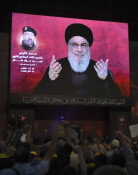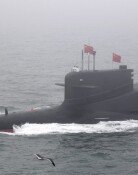Airport Puts Up SARS Defenses
Just outside Gate 7 at Incheon Int`l Airport at 1:50 p.m. on April 27, 143 inbound travelers coming off a chartered Asiana flight went through a series of screening procedures- having their body temperatures checked and filling out questionnaires.
Some of the braver ones chose to forego masks but most donned the now-ubiquitous Asian face covering, with some even doubling up.
“A doctor I know told me that I would be safe with at least three masks, so I wore all three on the two-hour flight,” said 28-year-old student Eom. “I have been keeping up with domestic news coverage on SARS in Beijing, but what is happening there is far worse than you see on TV,˝ he explained. “The city is in a state of panic.”
Doctors, nurses and medical staff from military hospitals were checking travelers` temperatures. They seemed to be on full alert and asked questions when necessary. ˝Students who studied in China must inform us,” a nurse said.
38-year-old Gwon, who cut short his Chinese language course in Beijing, was rushed to a hospital in Incheon after recording a temperature of 37.8 degrees at the airport. ˝I wear one more mask when checking travelers from China,˝ said 23-year-old corporal Lee Sang-joon dispatched from Wonju Military Hospital.
The National Medical Center and quarantine authorities at the airport are beefing up precautionary measures for students returning home from China as people reporting high fevers continues to rise. Using thermometers for temperature checks, health authorities have even installed an infrared camera outside the gate.
Some 36 military medical personnel, including nurses and army medics, were dispatched to the airport on April 23. And 29 inspectors working for the airport are now on longer shifts, working 36 hours with a 36-hour break instead of working a full day with a two-day break.
˝Some 7,000 people come from China every day and two to four people report such symptoms as high fever and dry coughs,˝ said Gwon Young-woon, a supervisor on the inspection team. ˝We are doing our job like soldiers on the frontline.˝
Flight attendants traveling to `red zones`, including Beijing and Hong Kong, are increasingly worried as the flu-like virus is spreading quickly throughout the region.
˝The company gave us SARS-related instructions this morning on SMS, which tells us to report to the manager if we have any SARS symptoms instead of going to the doctor,˝ said a 27-year-old flight attendant working for Korean Airlines. ˝I believe that the company intends to prevent news from breaking out of infections among flight attendants,˝ she added. ˝We are only allowed to wear masks on flights to Hong Kong, but we are a lot more worried after the message.˝
˝I wear goggles and use anti-bacterial hand cream during flights,˝ said Kim Sung-shim, a 27-year-old flight attendant with Asiana Airlines. ˝I take more precautions when I fly to Beijing or Hong Kong.˝
Meanwhile, the number of people using the airport has dropped to some 25,000 from 40,000 to 60,000 a day over SARS fears. Sales at duty-free shops and fast food chains have also declined sharply. Outlets selling hard liquor and cigarettes, which were previously among the most crowded places at the airport, saw sales drop by 45%, while import cosmetic counters suffered more than a 60% decrease.
Pharmacies, however, are enjoying booming sales for protective masks. ˝We are selling 150 to 250 masks a day, each worth 2,000 won,˝ said a Mr. Kim, who runs the drug store on the third departure floor.







